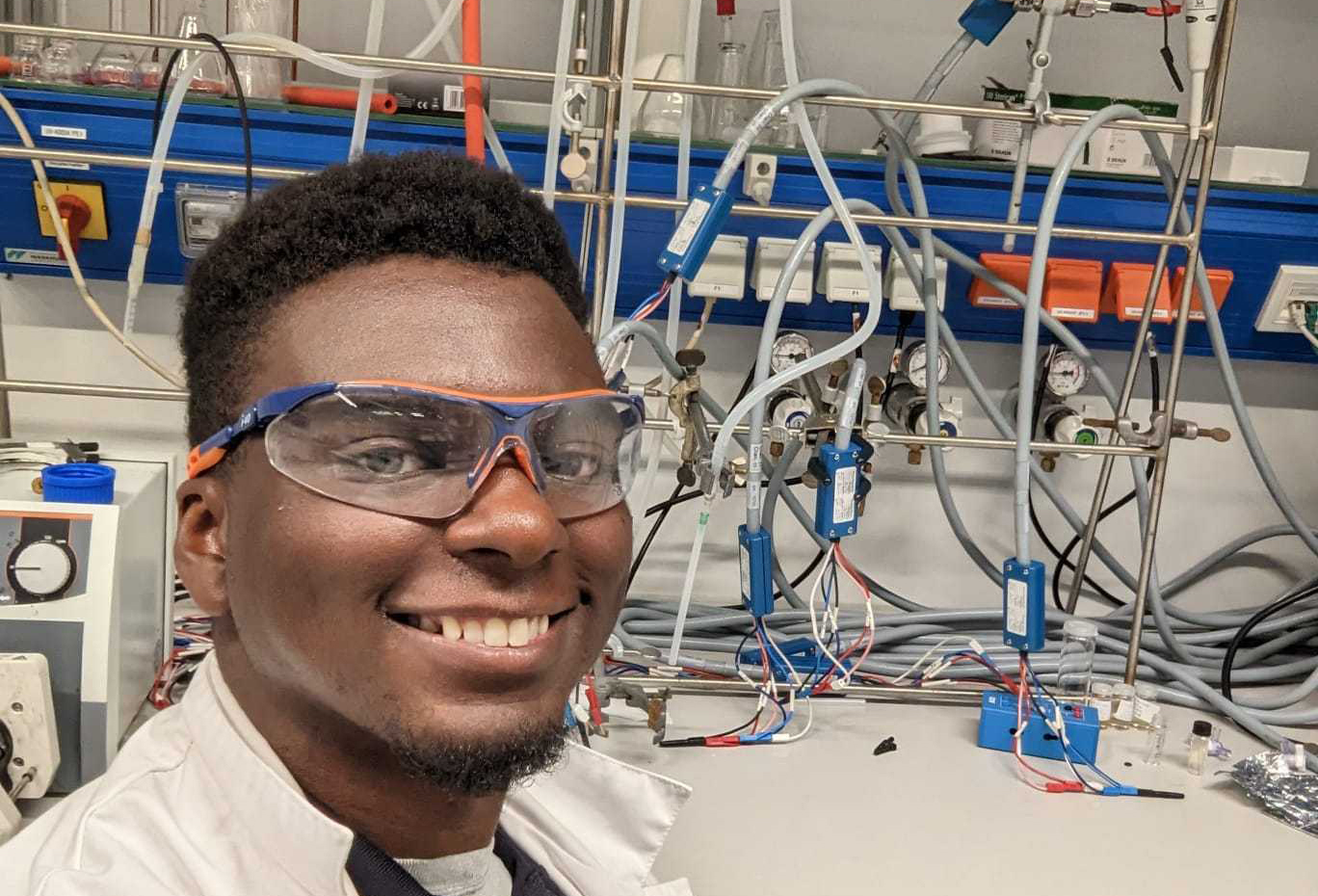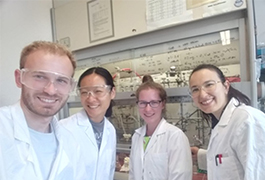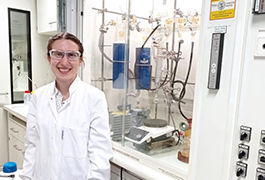Starting the Semester on the Right Foot
A new semester is on the horizon, campuses are about to come alive, and your life is about to get extremely active. There is endless potential in the air, but you have to be ready for a new—and likely challenging—course load. How can you set yourself up for success and keep the momentum strong when the grind sets in?
To figure that out, inChemistry scoured resources and reached out to two experts: Zahl Azizi has a bachelor’s degree in chemistry from the College of William & Mary and is a popular YouTuber whose videos highlight what it’s like to major in chemistry, and Kimberly Powers is an award-winning undergraduate academic advisor for the School of Chemical Sciences at the University of Illinois at Urbana-Champaign. Here are our best tips to get you on the right path.
First things first: get organized!
You’ll be spending much of your study time at your desk, on your bed, or in a quiet place on campus. If you’re in your room, the best way to keep your mind clear is to get your space cleared up and stocked with helpful supplies. If your desk is hiding under stacks of papers and empty coffee cups, move away the clutter and arrange everything you need as neatly as possible. It’s always helpful to have supplies and references within reach and a system for managing papers and files for each class. An organized space will save you from tearing your room apart looking for that organic chemistry study guide when crunch time hits.
Another important thing to prioritize organizing is your time. What classes are you taking? How demanding are they likely to be? Will you be applying for research experiences or graduate programs? Working or doing research? Participating in extracurricular activities? Caring for a family member? You can keep surprise deadlines and overlapping commitments at bay by adding everything you expect to participate in to your calendar.
A good approach is to block out class times first, Azizi says. Then add nonnegotiable commitments such as work-study or other jobs to your calendar. Carve out time to read each syllabus carefully (more than once!) and record deadlines for assignments, essays, special projects, and exams. Then reserve blocks of time for studying plus extra time before exams and deadlines. Finally, add in time for working on applications and research projects as well as events you know you want to attend, club meetings, activities with some time negotiability (such as exercise), and for when you want time away from everything to rest!
Now that you have the big picture of your semester, take a step back. Is it doable? Do you have enough time to play and rest? Do you need to make any changes? Make adjustments as needed and take special note of overlapping commitments, days with multiple exams, or other situations that will require extra planning, Azizi advises. You’ll have a lot going on throughout the semester, but try to take 5-10 minutes each weekend to browse through your calendar and set priorities for the coming week.
Your calendar will be most effective if you use a planner—either a hard-copy planner or an app—whatever works best for you. Some apps allow you to record to-do lists, homework assignments, and break down large tasks—like applying for graduate programs—into smaller chunks with individual deadlines. Adding everything to your calendar will take time, but in the end, it will help you stay on top of minutiae.


Get to know your professors
Your chemistry professors are your strongest allies. With their help, you can do better academically, learn about research and internship opportunities, and get letters of recommendation. Professors have much more to offer than the definitions of enthalpy, entropy, and free energy. They love sharing their knowledge and advice, but you’ll need to initiate a connection to them first by taking advantage of their office hours. Introduce yourself and, if you don’t have any homework questions, feel free to ask simple questions that genuinely interest you, Azizi says. You might ask questions such as: “Do you have any study tips for being successful in this class?” “I’d like to start working in a lab this semester. Do you know of any openings?” “Can you tell me about your research?” Your curiosity and sincerity will shine through.
If your free time doesn’t align with office hours, schedule a meeting or talk with the professor after class. Informal conversations like these can make it easier for you to seek help later should you need it, Azizi explains. They also form the basis of rewarding professional relationships. If professors know you and your interests, they’ll be more likely to share relevant opportunities for research and professional development with you. You may not hit it off with every professor, but that’s okay. When it comes to crunch time, they’ll have seen your commitment and will be invested in helping you succeed.
Sign up for activities
Student groups can be a rich source of community, renewal, professional development, and fun. Powers recommends that students start out by joining one or two organizations, prioritizing fun and professional development. Professional groups such as your school’s ACS Student Chapter help students develop key skills that aren’t taught in the classroom, such as leadership, networking, applying for grants, and science communication. They are a great way to learn about career options, deepen friendships with like-minded classmates, connect to the larger chemistry community, and learn the value of community work.
Some students find that the drudgery of assignments and exams dulls their passion for the field. If that’s you, consider rekindling the spark by participating in chemistry outreach events. Many departments and student groups promote the field through K-12 school visits, open houses, or demo shows. Volunteering can solidify your understanding of the field; help you develop leadership, teamwork, and communication skills; and reinforce what you love about the field.
Most chemistry departments host regular colloquia; add these to your calendar. You’ll be exposed to cutting-edge areas of research and new career opportunities as you mingle with departmental staff, faculty, and students. There may even be snacks! When it’s time for questions, don’t be afraid to introduce yourself and ask one, even if you didn’t follow all of the technical details in the presentation. Again, you can keep it simple. “What advice do you have for students interested in this field?” “How did you end up working on this research question?” You might make a connection that could change the course of your future. Keep an eye out for department picnics, lab tours, mentoring programs, or other community-building events, and get involved if you can. A strong departmental community benefits everyone.
Know where to get academic help
At some point during the semester, you’ll get stuck. That’s par for the course in a difficult major where each new topic builds on what you’ve already learned. If you line up resources and support now, you can spend less time searching for help and more time actually tackling the material you’re not grasping.
“If anyone’s interested in forming a study group, let’s talk after class” can be game-changing words. Don’t be afraid to say them, Azizi says. With various backgrounds and strengths, you and your classmates can help each other find that missing negative sign, talk through challenging problems, and see where you went wrong on exams. You can also create living shared documents for notes, questions, and comments. Group chats can be lifesavers for quick questions or verifying homework assignments. In addition, by helping your peers and getting help from them, you’ll likely solidify your understanding of chemistry, Powers says.
Remember office hours? Your professors have them for a reason—to help you—so take advantage of them. Asking for one-on-one help can be easier if you’ve already established a relationship, but if you feel intimidated, bring along your study group. If you have a class TA, take advantage of their office hours, too. Remember that you’re all on the same team; your professors want you to learn the material and do well in class.
It's also a good idea to ask professors, TAs, academic advisors, and students who’ve already taken your courses to recommend helpful resources. In addition, you can find course-specific resources online like Chemistry Resources at the University of North Carolina at Chapel Hill. Topical groups on social media platforms like Discord and Reddit may also be helpful. Bookmark these resources now, and they’ll be there when you need them.
Plan healthy ways to decompress
Most students know that sleep, healthy eating, and exercise are essential to managing stress, but prioritizing those habits can be challenging―especially on top of demanding coursework, time-consuming labs, and personal stressors. Build enjoyable and restful activities into your schedule by signing up for a fun class or club, joining an intramural sports team, or planning a weekly dinner date with a friend. Regular brain breaks increase productivity and focus.
After finishing tough tasks, Powers recommends rewarding yourself. Plan a road trip the weekend after midterms or a night out with friends after a big research presentation. Go for a walk after you finish your P-chem homework. You don’t need to plan the details now, but give yourself permission—and time on your calendar—to celebrate your accomplishments and nurture your whole self.
Sometimes a night out or weekend away can’t fix mental stress. If you’re feeling depression or anxiety at an intense level, there are resources available to help you at your school’s counseling center, health clinic, and other support offices. Check out community and national resources as well, such as the 988 Suicide & Crisis Lifeline in the US. You don’t need to be in crisis to seek support. Powers notes that counseling centers and campus resources exist to help students with all kinds of things, including text anxiety, time management, and working through a break-up. Compile this information now and keep it nearby so that if you or a friend need extra support, there’s no searching required.
Be optimistic
New semesters are full of new possibilities, so embrace the optimism. The next few months may test you in ways you haven’t experienced before, but remember that your family, friends, peers, and professors are on your side. Once you’ve taken the time to get organized and position yourself for success, you’ll be ready to embrace the brain-twisting concepts and unknown adventures of a new semester. Pace yourself and enjoy the ride.





